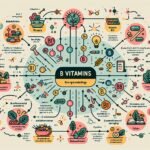
Vitamins and Minerals: Essential Nutrients and Their Benefits
Vitamins and minerals are essential nutrients that your body needs to function properly. They play a crucial role in many bodily processes, including metabolism, immune function, and bone health. While you can get most of the vitamins and minerals you need from a balanced diet, some people may need to take supplements to ensure they are getting enough of these vital nutrients.
Vitamins are organic compounds that your body needs in small amounts to maintain good health. There are 13 essential vitamins that your body needs to function properly, including vitamins A, C, D, E, and K, as well as the B vitamins. Each vitamin plays a unique role in your body, from helping to maintain healthy skin and eyes to supporting brain function and energy production.
Minerals, on the other hand, are inorganic substances that your body needs to carry out a range of functions, from building strong bones and teeth to maintaining healthy muscles and nerves. There are many different minerals that your body needs, including calcium, iron, magnesium, and potassium. While some minerals are found in large amounts in the body, others are only needed in trace amounts, but are still essential for good health.
Overview of Vitamins
Vitamins are essential nutrients that are required by your body to carry out various normal functions. They are organic substances that cannot be produced by your body and must be obtained from the food you eat or supplements you take. Vitamins are classified as either fat-soluble or water-soluble.
Fat-Soluble Vitamins
Fat-soluble vitamins are those that dissolve in fat and are stored in your body’s fatty tissues. They include vitamins A, D, E, and K.
Vitamin A
Vitamin A is essential for maintaining good vision, healthy skin, and a strong immune system. It is found in animal products such as liver, egg yolks, and dairy products, as well as in colorful fruits and vegetables like carrots, sweet potatoes, and spinach.
Vitamin D
Vitamin D is important for maintaining strong bones and teeth, as well as for supporting your immune system. Your body can produce vitamin D when your skin is exposed to sunlight, and it can also be found in fatty fish, egg yolks, and fortified foods like milk and cereal.
Vitamin E
Vitamin E is an antioxidant that helps protect your cells from damage. It is found in nuts and seeds, vegetable oils, and leafy greens.
Vitamin K
Vitamin K is important for blood clotting and bone health. It is found in leafy greens, such as spinach and kale, as well as in fermented foods like sauerkraut.
Water-Soluble Vitamins
Water-soluble vitamins are those that dissolve in water and are not stored in your body, so you need to consume them regularly. They include vitamins B and C.
Vitamin B
The B vitamins are a group of vitamins that play important roles in energy production, brain function, and cell metabolism. They are found in a variety of foods, including whole grains, meat, fish, dairy, and leafy greens.
Vitamin C
Vitamin C is an antioxidant that helps protect your cells from damage, and it also plays a role in collagen production and immune function. It is found in citrus fruits, berries, kiwi, and leafy greens.
Incorporating a variety of foods rich in both fat-soluble and water-soluble vitamins can help ensure that you are getting all the essential nutrients your body needs to function properly.
Key Minerals and Their Functions
Macro Minerals
Macro minerals are minerals that your body needs in larger quantities. These minerals are essential for the proper functioning of the body.
Calcium
Calcium is essential for strong bones and teeth. It also plays a crucial role in muscle function, nerve transmission, and blood clotting. Calcium can be found in dairy products, leafy green vegetables, and fortified foods.
Magnesium
Magnesium is necessary for the proper functioning of muscles and nerves. It also helps to regulate blood sugar levels and blood pressure. Magnesium can be found in nuts, seeds, whole grains, and leafy green vegetables.
Potassium
Potassium is essential for the proper functioning of muscles and nerves. It also helps to regulate blood pressure and fluid balance in the body. Potassium can be found in bananas, potatoes, avocados, and leafy green vegetables.
Trace Minerals
Trace minerals are minerals that your body needs in smaller quantities. These minerals are essential for the proper functioning of the body.
Iron
Iron is essential for the production of hemoglobin, which carries oxygen in the blood. It also plays a role in the proper functioning of the immune system. Iron can be found in red meat, poultry, fish, beans, and fortified cereals.
Zinc
Zinc is necessary for the proper functioning of the immune system. It also plays a role in wound healing and the proper functioning of taste and smell. Zinc can be found in oysters, red meat, poultry, beans, and fortified cereals.
Selenium
Selenium is essential for the proper functioning of the immune system. It also plays a role in thyroid function and the prevention of oxidative damage. Selenium can be found in Brazil nuts, fish, poultry, and fortified cereals.
In conclusion, macro and trace minerals are essential for the proper functioning of the body. Make sure to include a variety of foods in your diet to ensure that you are getting all the necessary minerals.
Frequently Asked Questions
What foods are the best sources of essential vitamins and minerals?
A well-balanced diet that includes a variety of foods can provide all the essential vitamins and minerals your body needs. Some foods are particularly rich in certain vitamins and minerals. For example, citrus fruits are a great source of vitamin C, while dairy products are high in calcium. Leafy green vegetables are a good source of iron and vitamin K. Fish and nuts are rich in omega-3 fatty acids.
How do different vitamins and minerals function in the body?
Each vitamin and mineral has a unique role in the body. For example, vitamin A is important for vision, while vitamin D is essential for bone health. Iron is needed to make hemoglobin, a protein in red blood cells that carries oxygen throughout the body. Calcium is important for strong bones and teeth. Vitamin C is an antioxidant that helps protect cells from damage.
Which vitamins and minerals are crucial for immune system health?
Several vitamins and minerals are important for a healthy immune system. Vitamin C, vitamin D, and zinc are particularly important. Vitamin C helps to stimulate the production of white blood cells, while vitamin D helps to regulate the immune system’s response to infections. Zinc is involved in the production of immune cells and helps to fight off infections.
What are the daily recommended intakes of essential vitamins and minerals?
The daily recommended intakes of vitamins and minerals vary depending on age, gender, and other factors. The Office of Dietary Supplements provides a list of recommended daily intakes for different vitamins and minerals. It’s important to note that taking too much of certain vitamins and minerals can be harmful, so it’s best to get nutrients from food whenever possible.
How can one identify deficiencies in vitamins and minerals?
Deficiencies in vitamins and minerals can cause a range of symptoms, depending on the nutrient involved. For example, a deficiency in vitamin C can cause fatigue, muscle weakness, and joint and muscle aches. A deficiency in iron can cause anemia, which can lead to fatigue and weakness. If you suspect you have a nutrient deficiency, it’s important to talk to your doctor.
What are the potential health risks of taking too many vitamins and minerals?
Taking too much of certain vitamins and minerals can be harmful. For example, taking too much vitamin A can cause liver damage and birth defects. Taking too much iron can cause stomach pain, nausea, and vomiting. It’s important to follow the recommended daily intakes for vitamins and minerals and to talk to your doctor before taking any supplements.











